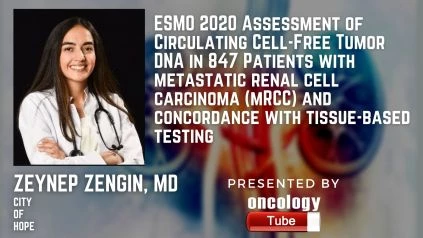Dr. Zeynep Zengin, post-doctoral fellow at City of Hope discusses the ESMO Virtual Congress 2020: Assessment of Circulating Cell-Free Tumor DNA in 847 Patients with metastatic renal cell carcinoma (mRCC) and concordance with tissue-based testing.
(UroToday.com) For patients undergoing systemic therapy for metastatic renal cell carcinoma (mRCC), biomarkers need to be identified to guide initial treatment decisions and to track treatment response. A non-invasive approach to determining tumor-level genetic modifications is the evaluation of circulating cell-free tumor DNA (ctDNA). Previously, ctDNA profiles have been shown to develop along with advanced kidney cancer treatment. It is important to understand the concordance of changes in tumor tissue with ctDNA profiles.
Zeynep Zengin, MD, presented the findings of a cohort study using a commercially available ctNDA assay in a submitted paper presentation at this year’s European Society of Medical Oncology (ESMO) 2020 Virtual Annual Meeting.
The authors identified 847 consecutive patients with advanced renal cell carcinoma who had undergone ctDNA testing using a clinically validated 73 or 74-gene panel, the commercially available Guardant360 tool. Between November 2016 and December 2019, these patients underwent testing. Sequence changes, minor insertions and deletions, amplifications, and fusions were analyzed by a targeted next-generation sequencing assay of ctDNA.Â
In addition, the authors compared genetic alterations identified in ctDNA assays with those detected by tissue-based testing using either whole-genome sequencing (Ashion Analytics) or targeted next-generation sequencing (Foundation Medicine) among a subset of included patients with available tissue (n = 47).Â
The authors included, as stated, 839 out of 847 patients (8 omitted due to suspected urothelial histology), of whom 600 were men and 247 were women. In 669 of 929 samples of ctNDA (72 percent), at least one genetic alteration was found. Except for variants of uncertain significance and synonymous variants, TP53 (37 percent), VHL (22 percent), and EGFR (6 percent) were the most frequently reported genetic alterations found in the ctDNA study.
Finally, across 39 patients, the authors analyzed sequential improvements in ctDNA assay outcomes over time. As shown on the right side of the above figure, mutation rates, especially in EGFR and PTEN, have increased over time.
VHL (64 percent), PBRM1 (45 percent), and SETD2 (32 percent) were the most frequently reported genetic alterations among the 46 patients from whom tissue-based DNA analysis could be carried out. Notably, the ctDNA panel did not include PBRM1 and SETD2. 154 genetic alterations were observed among those genes used in the ctDNA assay throughout both approaches to the assay. Of these 154 alterations, 41 (27%) were detected in blood samples only (red; ctDNA), 92 (60%) were detected in tissue samples only (green), and 21 (14%) were detected in both platforms (blue, in the figure below). Notably, the ctDNA and tissue DNA concordance was 96.2 percent. Concordance was greater among patients who underwent ctDNA and tissue-based testing within six months of each other.
The authors conclude that the study of ctDNA is both feasible in mRCC patients and that it is compatible with genetic alterations seen in tissue-based study. As a consequence of time and treatment constraints, differences between ctDNA and tissue-based research indicate tumor evolution.Â
Presented by: Zeynep B. Zengin, MD, City of Hope Postdoctoral Fellow, Los Angeles, CA.

